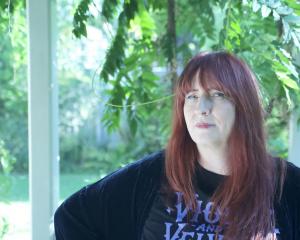THE ROAD TO CHATTO CREEK
Matt Chisholm
Allen & Unwin
REVIEWED BY HAYDEN MEIKLE

Bear with me here.
This is not to suggest my old school chum likes to drive fast cars (he prefers a muddy ute), write nasty things about estranged Royal Family members (he can seem cocky but he does not go out of his way to offend) or punch television producers (might have to ask the folks at TVNZ about that one).
No, my theory is that Chisholm might be doing for the New Zealand farming community what Clarkson has been doing for the equivalent in Britain.
All reports are that Clarkson’s Farm, the documentary series in which Clarkson attempts to run his 400ha farm in Chipping Norton, West Oxfordshire, has gone down a treat.
It’s a surprisingly watchable show - Clarkson is a very funny man when he is not going out of his way to offend - packed full of genuine characters and some insight into the trials and tribulations of farming life.
They say the rural types in Britain have embraced it because the television megastar has helped city dwellers understand how bloody tough farming can be, and how bloody vital it is at the same time. See, I got there.
Matt Chisholm, who has a genuine gift for relating to all sorts of people, has become something of an evangelist for the New Zealand farming life, and a flag-bearer for our rural champions who, sadly, seem to have become less understood - or even maligned - by city dwellers who think meat and veges come from supermarket shelves.
The Road To Chatto Creek is Chisholm’s second book.
While his first dealt with his own life story, dominated by his battle with booze and his fascinating television career, this one is a love letter to the land.
He was obsessed with the idea of being a farmer as a kid, and after making a little dough on the screen, he and wife Elle bought a patch of land at Chatto Creek, in golden Central Otago, on which to raise their three children.
The book charts the development of the Chisholm property and its loquacious owner’s education in everything from animal husbandry to fencing, from cropping to crutching.
There is an early line - ‘‘Living your dream down on the farm can be delightful, but at times that dream can also be a bloody nightmare.’’ - that sets the tone for all sorts of scrapes and struggles, some of which leave the ex-Waitakian wondering what on earth he was thinking.
The best bits of the book are when Chisholm introduces some of the characters, the good buggers, who help him when the chips are down, while he also weaves in some nice stuff about heartland living, including the importance of sport and social functions, and tells more about his passion for helping farmers work on their mental health.
For this farmer’s son, who has not really been a man of the land for 30 years, Matt Chisholm has offered a lovely reminder of how this country was built on the backs of farmers.
Almost makes me want to put down the keyboard and buy a ute.
Hayden Meikle is the ODT sports editor













